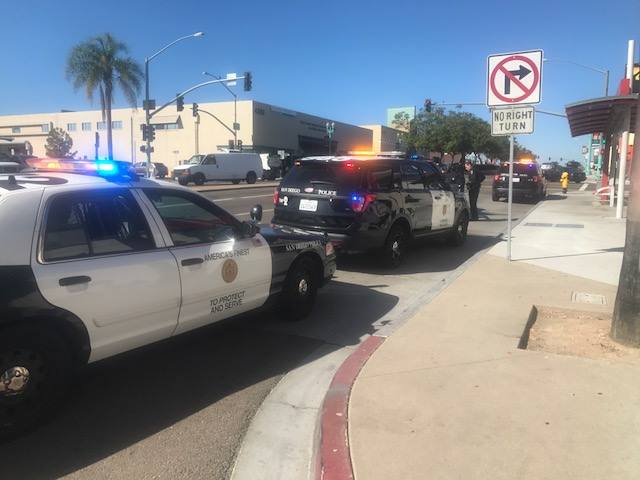Social media and the news have desensitized us to violence. With the onslaught of tragic events ranging from natural disasters to mass shootings, incidents involving police brutality and use of excessive force no longer surprise us. It is because of this that I felt compelled to share what I recently witnessed in San Diego, with the hope that we could regain some of the humanity we have lost along the way and learn how to work collaboratively to ensure a better quality of life for all.
While running errands through City Heights, I noticed an officer stop a couple of adolescents, ironically, right in front of the Copley YMCA (where “Everybody belongs”). The kids did not appear unruly or uncooperative but they were clearly trying to tell the police officer something he was not trying to listen to. As I waited for the light to change, I listened to the officer as he asked for the young man’s age (17) and then proceeded with his directives. The young couple continued pointing in a particular direction, clearly trying to explain something to the office, but unfortunately, the officer was still dismissive. Instead, the officer adamantly instructed the youth to “Sit down or I will do it for you.”
At this point I imagine that the officer, the young man, and the young lady were all feeling frustrated. I could tell by their voices that tensions were building. As a result, the officer attempted to physically force the young man to sit down. Determined to get the youngster to oblige, the officer pulled the reluctant adolescent by his arms and swung him around, unintentionally smacking his head into the young lady’s face. This led to the youth being thrown over one of the concrete blocks adorning the street corner (similar to the one he was initially instructed to sit on). In the background the young lady’s shouts to, “Stop! Leave him alone!” went unanswered.
This all took place in a matter of minutes and the next thing I knew six SDPD vehicles were rushing to the scene. Is this what our tax dollars and resources are typically spent on? Perhaps that is why we can’t make better strides in the City of San Diego to shorten response times for real emergency calls. I parked my car and walked toward the corner in search of a senior officer. I would be remiss not to mention how nervous I was even though I had nothing to do with what happened. I was fearful that I would somehow end up being in trouble myself because it has been ingrained into minority communities that police encounters are always negative. Needless to say, this sentiment has been bolstered by numerous reports of police brutality.
Nevertheless, I approached four of the officers and as I mustered up the courage to express my concerns, I was quickly “reassured” that the officer was within his right and followed procedure. I mentioned to the sergeant that I had seen how quickly the encounter had escalated into a physical altercation. The sergeant informed me that if an individual refused to oblige an officer’s request then the officer was left no other recourse. Seeing the consternation on my face, the sergeant continued to explain that the young man and the young woman were going to get picked up regardless because of a truancy report from school. I nodded, thanked the officer for his time, and took one last look at these two young people cuffed in the back of squad cars. Two more youth introduced to the justice system, adding to the more than 1.1 million cases handled in juvenile courts within the US annually.
Does truancy really justify the use of excessive force? I’m confident that many police officers made similar mistakes as kids, with the major difference being that that they never got caught or perhaps provided better guidance. Perhaps someone helped correct their behavior before they were sacrificed to the criminal justice system. I’ve had opportunities to work with law enforcement, and I can honestly say that the actions of an individual should not define an entire group. However, if law enforcement wants to change their association with police brutality and excessive force – then a real effort needs to be made when approaching inner-city youth. I understand that personal safety is of concern, that police have to remain vigilant; however, these are not excuses to perpetuate the criminalization of our youth and continue subjecting them to the financial hardships and psychological burdens of the judicial system.
In a country with over 2.2 million people currently incarcerated, of which there are approximately 70,000 youth on any given day, we have to be more strategic about our approaches for prevention. It’s already bad enough that one in three kids (predominantly of color) have had one parent that has been incarcerated. We are setting low standards and expectations (if any) for a healthy, productive life for our youth and the generations that follow them. We need to foster relationships between law enforcement and the community to avoid these situations. Events like this are unacceptable and need to stop.
Beto Vasquez
Beto recently graduated from UCSD obtaining a Masters degree in biology and ultimately plans to fulfill a doctoral degree and pursue a career as a community college administrator. Having had experienced a life of incarceration (juvenile-adult), he is all too familiar with the multifaceted challenges this population faces.
He is an educational advocate for marginalized groups and a great proponent of diversity in Science, technology, Engineering & Mathematics (STEM) fields. He is very active in the community and has assisted with designing programs and events (for ex-offenders and men of color in STEM), and uses his story to motivate others– specifically at-risk populations.
Latest posts by Beto Vasquez (see all)
- ¿Qué Constituye Una Fuerza Excesiva? - November 17, 2017
- What Constitutes Excessive Force? - November 16, 2017

